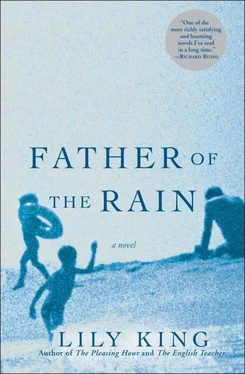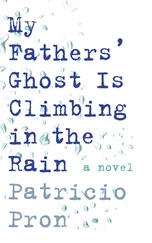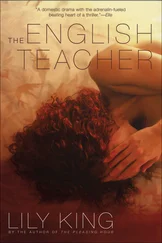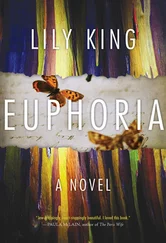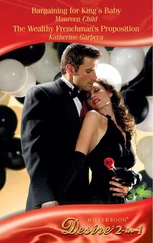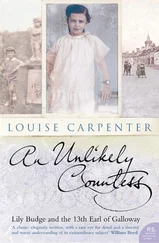“No idea. But it didn’t improve when she married Hayes, that’s for sure.”
“Was he a drinker, too?”
“I think so. But with him it was harder to tell. He was a big guy. I was a little pipsqueak next to him.”
“Did he ever hit you?”
“No, he never hit me.” I notice a slight emphasis on me .
“Your mother?”
“I think so.”
“Oh, Dad.”
“Yeah. Well,” he says, pushing the cellophane down deep and smothering it with sand. “They’re all dead now. Good riddance.”
He lies down then, tips his face away from the sun, and very soon his hand twitches twice and he is asleep. I walk down to the water. The sand is loose and cold and a wave breaks and rushes at my ankles, then pulls away hard, sucking the sand beneath everything but the very center of my feet. The outdoors always brings Jonathan so much closer. He’d stand here with me and feel the sand get sucked away, feel the thin line beneath each foot you were left balancing on. I can feel his fingers on my arm as I start to walk back to the towel. Wait, he’s saying, one more time. Why didn’t I take him to Ruby Beach? Why didn’t we go right there? I’d had the dogs’ leashes in my hand. We could have watched the dogs sprint down to the water in their clouds of sand. We would have said different things there. We never would have been so cruel to each other. When I think of our exchange of fuck-yous I feel like someone is lighting my stomach on fire.
I read The Gate of Angels on my towel. I dab sunblock on my father’s nose when it begins turning red, and he barely wakes up, just murmurs a thank-you and drifts off again. Eventually I put my book down and try to rest, too.
But I can’t. Resting and sleeping have become harder since Jonathan was here. My mind churns. It wants to pore over what happened on the terrace, and then it wants to go back. It wants to relive everything, as if in the process it can change the ending. Now we’re on his bed, the first time I ever spent the night at his place. We’ve been touching and talking for hours. It’s 3 A.M. and he’s lying against me sideways, his head on my stomach, the backs of his fingers running along the inside of my arm. He’s telling me about Wicker Street.
“I was surprised the first time someone referred to my building as ‘the project on Wicker Street.’ Projects were something else. The projects weren’t where we lived.” When he entered fourth grade he had to go to a white school they were trying to integrate thirty minutes away. To get inside the school from the bus, they had to walk through a thin space between two lines of white parents hollering at them to go home. “We would have liked to go home, let me tell you.” Their parents told them to keep their heads down and keep walking. They put their fists in their pockets. “There’s a photo of it my mother cut out of the newspaper. If you look really closely you can see the outline of my friend Jeff’s middle finger flipping them all the bird.” Once they got into the school they were fine. It was the parents who gave them the most trouble. His first white friend was a boy named Henry. Henry had a cat, and whenever they went to Henry’s house this cat would be curled up on the couch and Henry would give it a stroke and then Jonathan would give it a stroke and it would leap five feet in the air.
The worst thing he could be called by one of his older brothers, he told me, was white. “They’d see me playing with my friends and they’d say we played white. This brown pair of shoes my mother bought me was white. The way I took off my shirt was white. And then my mother would knock me upside the head and say I was acting like a nigger.”
When his mother got her nursing license, they moved into their own house. They had a backyard with one tree. “I remember sitting alone in the evening on the grass one of the first nights we lived in that house and looking up at that tree, just a slender little tree with smooth bark, and I got this feeling about the tree, that I liked it and it liked me. And it occurred to me that the tree didn’t care if I was black or white. Really, honestly, didn’t care. It didn’t matter to the tree. And for a few seconds I kind of felt like I was floating. I think that’s the first time and maybe the last time I felt free, truly free.”
“From being black?” I asked.
“From being anything but what I really was.”
“Get away, you fucker. Get the fuck away!” My father is swatting at a seagull. It has hopped out of reach but is still looking intently at the corner of plastic wrap sticking out of the sand. “Oh for God’s sake, take it.” But when he throws it, the seagull isn’t interested. “I don’t know what you want, then. I can’t help you.” He sits up. “Let’s get out of here.”
I think we can make the four o’clock ferry, but we hear it pull out while we’re still in the woods.
“Jesus H. Christ,” my father says, his fists clenched tight.
“It’ll come right back. They leave every half-hour.”
He looks at me as if I’ve arranged it all on purpose. He’s a little boy who’s woken up from his nap in a terrible mood.
“Take a few deep breaths, Dad.”
“And you take a long walk off a short pier. Christ, I need a drink.”
“Very funny.” But I see he wasn’t joking. He’d forgotten. I watch the rage pour into his face.
“You know what, Daley?” Day- lee .
Before he can tell me what, I say, “I don’t want to hear it. Just keep it to yourself. You’re in a shitty mood and I’m in a shitty mood so let’s just get on the ferry and go home.”
“I’m not going to that goddamn meeting tonight.”
I’ve been waiting for this. I’ve even rehearsed my calm response. “Okay.”
“I am so sick of those people and their problems. I don’t have anything in common with them. Nothing.”
“Except that you want a drink.”
At quarter of seven that night he calls up to my room. When I come down into the kitchen he’s showered and dressed and standing by the door.
When I was little my father loved to surprise people. It was not uncommon for him to go upstairs during a dinner party and come down in a Marie Antoinette wig and my mother’s underwear. Once he gave us all presents on his birthday. At Christmas there was always something unexpected: a kitten, a drum set, a new car in the driveway. But if the surprise was revealed prematurely, look out. Garvey never received the Ping-Pong table he found in the shed two days before his birthday, and my father never spoke to Mr. Timmons again after he told my mother to have a good time in Hawaii — which was to be a surprise for their fifteenth wedding anniversary. Apart from their abrupt departures, neither my mother nor Catherine had been much for creating surprises themselves, and I doubted his unhappy mother or even Nora, who was kind but not playful, had done much in the way of the unexpected for him. So I decide to throw my father a surprise party on the twenty-ninth of August, which is both his birthday and his sixtieth day of sobriety.
I stop by Neal’s to ask if he knows any caterers. He gives me the number of someone named Philomena. His shop is empty so we sit on the stoop. The town is fogged in this morning, the air so wet and briny it’s hard to inhale, as if salt and seaweed have been ground up into it. Even without the sun, it’s already hot. Neal is wearing shorts, which look funny on him and he seems to know it. He keeps covering his pale knees with his hands. His hair has curled into ringlets around his ears.
“How do you know her?”
It would be just like Neal to have a girlfriend named Philomena.
“She’s an old friend of the Dead Girl.”
Читать дальше
